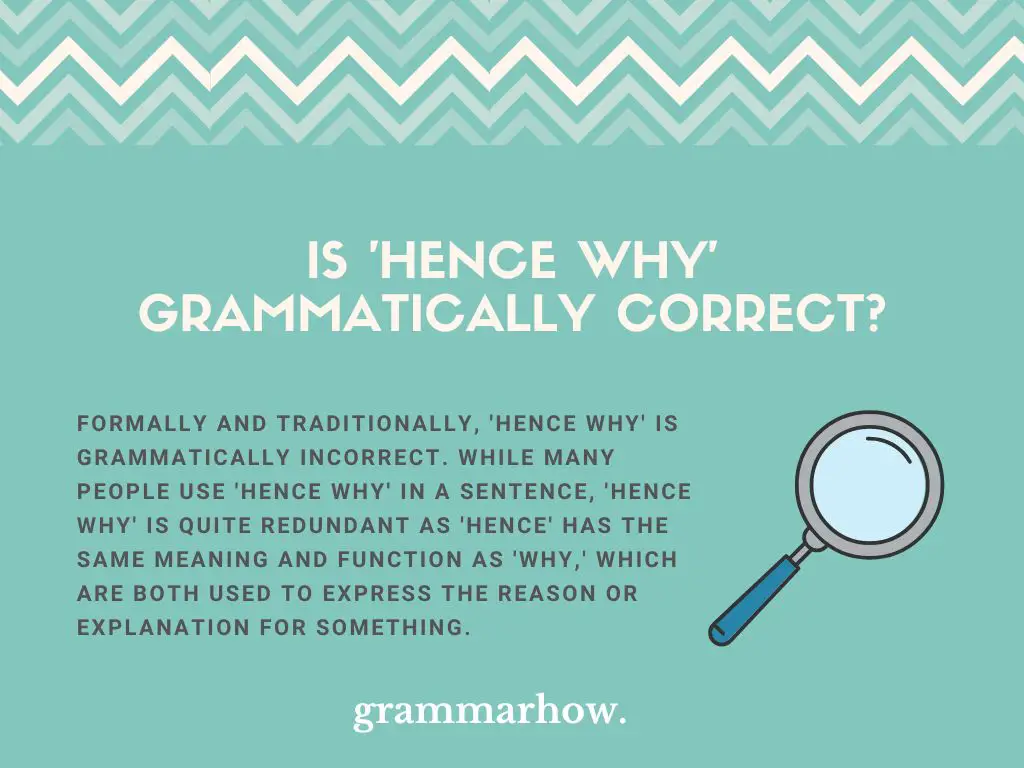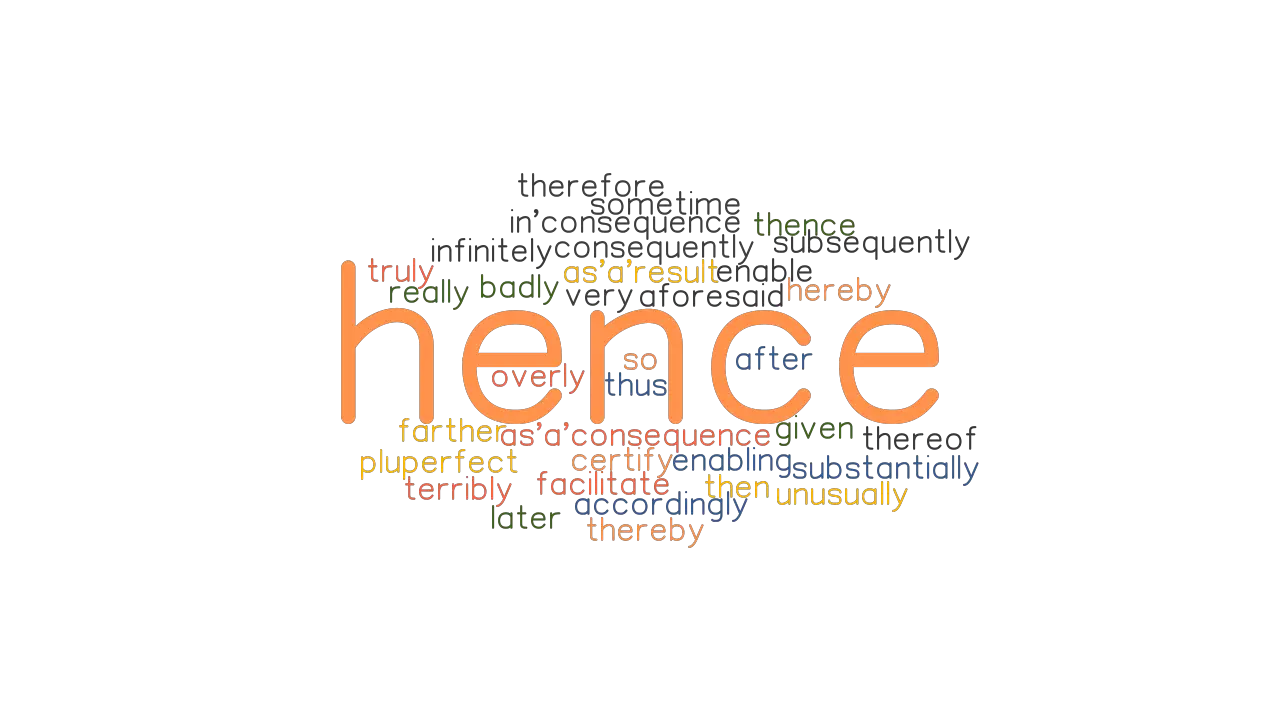The Intriguing World Of "Opposite Of Hence": A Deep Dive
Let’s talk about something that might sound simple but carries layers of complexity – the opposite of hence. If you’ve ever found yourself scratching your head over this term, you’re not alone. Hence is a word that’s been around for centuries, and while it’s commonly used to indicate reasoning or consequence, its opposite is a little trickier to pin down. So, buckle up, because we’re about to unravel the mystery behind what lies on the other side of hence.
Now, you might be wondering, why does the opposite of hence matter? Well, language is like a puzzle, and every word has its place. Understanding opposites helps us grasp the nuances of communication. Whether you’re a student, a writer, or just someone who loves playing with words, knowing the opposite of hence can add depth to your vocabulary and sharpen your linguistic skills.
So, what exactly is the opposite of hence? Is it a single word, or does it require a phrase to fully capture its meaning? Stick around as we dive into this fascinating topic, explore its nuances, and uncover some surprising insights along the way. This isn’t just about definitions; it’s about understanding how language shapes our thoughts and conversations.
Read also:Lil Durk Quotes A Deep Dive Into The Words Of A Street Poet
Understanding "Hence" – The Foundation for Its Opposite
Before we jump into the opposite of hence, let’s take a moment to understand what hence really means. In the simplest terms, hence is used to show cause and effect or to point out the reason behind something. It’s like saying, “Because of this, that happens.” For example, “The storm caused a power outage; hence, we had to use candles.”
But here’s the kicker – hence can also indicate time. When you say, “I’ll be there in an hour hence,” you’re talking about a future point in time. This dual functionality makes finding its opposite even more intriguing. So, how do we approach this? Let’s break it down step by step.
Defining the Opposite of Hence: A Linguistic Challenge
Now, let’s get to the heart of the matter. What is the opposite of hence? Unlike words like hot and cold or up and down, hence doesn’t have a straightforward antonym. Instead, its opposite depends on the context in which it’s used. Here’s where things get interesting:
- When hence refers to cause and effect: The opposite could be a word or phrase that negates causation. Think of it as “despite this” or “without reason.”
- When hence refers to time: The opposite might point to the past rather than the future. Words like “ago” or “before” come to mind.
So, the opposite of hence isn’t just one word – it’s a concept that shifts based on the situation. Cool, right?
Breaking Down Contextual Opposites
Let’s dig deeper into these contextual opposites. Here are a few examples to help clarify:
In the sentence, “The team won the match; hence, they celebrated,” the opposite of hence could be “The team lost the match; therefore, they didn’t celebrate.” See how the meaning flips? It’s all about reversing the logic.
Read also:Nigerian Lace Styles A Celebration Of Culture And Elegance
On the other hand, if you’re talking about time, “An hour hence” can be flipped to “An hour ago.” Simple yet powerful, isn’t it?
Why Does the Opposite of Hence Matter?
You might be thinking, “Why bother with the opposite of hence? Isn’t it just a word?” Well, words have power, and understanding their opposites can enhance your communication skills. Whether you’re writing an essay, crafting a speech, or engaging in a heated debate, knowing how to flip meanings can make you more persuasive and articulate.
Plus, exploring opposites encourages critical thinking. It challenges you to question assumptions and see things from different angles. In a world where communication is key, mastering nuances like this can give you an edge.
Common Misconceptions About the Opposite of Hence
There are a few misconceptions floating around when it comes to the opposite of hence. Some people assume it’s always a single word, while others think it’s interchangeable with synonyms like “therefore” or “thus.” Let’s clear up these myths:
- Myth 1: The opposite of hence is always “therefore.” Nope! While they’re related, their opposites differ based on context.
- Myth 2: Hence and its opposite are interchangeable. Wrong again! They serve different purposes in a sentence.
By understanding these nuances, you’ll avoid common pitfalls and use language more effectively.
Exploring Synonyms and Antonyms
To fully grasp the opposite of hence, it’s helpful to explore its synonyms and antonyms. Here’s a quick rundown:
Synonyms for Hence
For cause and effect: therefore, thus, consequently, accordingly
For time: afterward, subsequently, later
Antonyms for Hence
For cause and effect: despite, regardless, irrespective
For time: ago, before, previously
See how these words fit into different contexts? It’s all about choosing the right tool for the job.
Practical Applications of the Opposite of Hence
Now that we’ve covered the theory, let’s talk about how you can apply this knowledge in real life. Whether you’re writing, speaking, or even thinking, understanding opposites can elevate your communication. Here are a few practical examples:
- Use the opposite of hence to craft compelling arguments in essays or presentations.
- Incorporate it into creative writing to add depth and complexity to your stories.
- Apply it in everyday conversations to express contrasting viewpoints more effectively.
Remember, the goal isn’t just to use fancy words – it’s to communicate clearly and impactfully.
Historical Perspective: How Hence Has Evolved
To truly appreciate the opposite of hence, it’s worth looking back at its historical roots. The word hence comes from Old English and has been part of our language for over a thousand years. Over time, its meaning has shifted, adapting to the needs of speakers and writers.
In medieval texts, hence was often used to indicate movement or departure, as in “He departed hence.” Today, its usage is more abstract, focusing on reasoning and time. This evolution highlights the dynamic nature of language and reminds us that opposites can change too.
Modern Relevance of the Opposite of Hence
In today’s fast-paced world, clarity and precision in communication are more important than ever. Whether you’re drafting emails, creating content, or engaging on social media, knowing the opposite of hence can help you stand out. It shows attention to detail and a willingness to think outside the box.
Moreover, understanding opposites can foster empathy. By considering alternative perspectives, you open yourself up to new ideas and deeper connections with others. That’s the beauty of language – it’s not just about words; it’s about relationships.
Conclusion: Embracing the Complexity of Language
In conclusion, the opposite of hence isn’t as straightforward as it seems. It’s a concept that depends on context, purpose, and intention. By exploring its nuances, we gain a deeper appreciation for the intricacies of language and the power of words.
So, the next time you find yourself using hence, take a moment to think about its opposite. Challenge yourself to experiment with different phrasing and see how it enhances your communication. And don’t forget to share your thoughts in the comments below – I’d love to hear what you think!
Until next time, keep exploring, keep learning, and keep pushing the boundaries of language. After all, words are our greatest tools, and the more we understand them, the better we can connect with the world around us.
Table of Contents
- Understanding "Hence" – The Foundation for Its Opposite
- Defining the Opposite of Hence: A Linguistic Challenge
- Breaking Down Contextual Opposites
- Why Does the Opposite of Hence Matter?
- Common Misconceptions About the Opposite of Hence
- Exploring Synonyms and Antonyms
- Practical Applications of the Opposite of Hence
- Historical Perspective: How Hence Has Evolved
- Modern Relevance of the Opposite of Hence
- Conclusion: Embracing the Complexity of Language
Article Recommendations


